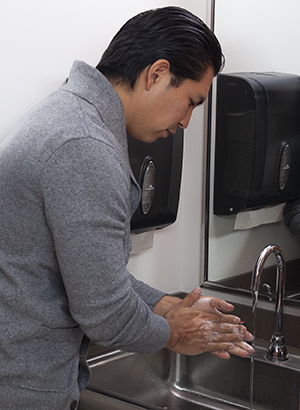Handwashing: Tips for Patients, Family, and Friends
Germs are everywhere around us. Normally, we live with germs without getting sick. In certain cases, harmful germs cause us to get sick with an infection. Or we can spread harmful germs to others and cause them to get sick. Keeping your hands clean is the best way to prevent getting or spreading germs that cause infection. Wash your hands with soap and water or use an alcohol-based hand cleaner.

When to clean your hands
You can come in contact with many harmful germs. To help prevent infection, wash your hands often, especially:
-
Before, during, and after preparing food
-
Before and after eating
-
After using the bathroom
-
After blowing your nose, coughing, or sneezing or whenever you use a tissue
-
Before and after touching or changing a dressing or bandage, or treating a wound
-
After touching any object or surface that may be contaminated
-
After touching garbage
-
After touching an animal, for example at a hospital, clinic, school, or other public setting
-
After touching an animal, playing with, cleaning up after a pet, or handling pet food
If you don’t have access to soap and water, use an alcohol-based hand gel containing at least 60% alcohol. These products kill most germs and are easy to use. But if your hands are visibly dirty, use soap and water (not alcohol-based hand gel).
When to clean your hands in the hospital: For family and friends
When visiting or caring for a loved one, washing your hands or using an alcohol-based hand cleaner can help stop germs from spreading. Wash your hands:
-
Before entering and after leaving the patient’s room
-
As soon as you remove gloves or other protective clothing
-
After changing a dressing or bandage
-
After any contact with blood or other body fluids
-
After touching or changing the patient’s bed linen or towels
-
After touching an animal during a pet therapy session (hospital)
-
After touching an animal, cleaning up after a pet, or preparing food for pets (home)
Many hospitals have sinks or gel dispensers right outside patient rooms. If not, carry a bottle of alcohol-based hand gel with you. Use it every time you visit. If your hands are visibly dirty, use soap and water (not alcohol-based hand gel).
Tips for good handwashing
Here are some suggestions to follow:
-
Use either cold or warm clean, running water and plenty of soap. Work up a good lather.
-
Clean the whole hand, including under your nails, between your fingers, and up the wrists.
-
Scrub for at least 20 seconds. Don’t just wipe or pass your hands through the water. Scrub well. Sing the Happy Birthday song to reach the 20- second goal
-
Rinse. Let the water run down your fingers, not up your wrists.
-
Dry your hands well. Use a paper towel to turn off the faucet and open the door.
Time matters
The longer you wash your hands, the more germs you’ll remove. Most people wash their hands for 6 to 7 seconds. But at least 20 seconds are needed to remove germs. Singing Happy Birthday or the ABC Song are examples of how long 20 seconds would be.
How to use an alcohol-based hand cleaner
Alcohol-based hand cleaners can be used when soap and water aren't available or when your hands aren’t visibly dirty. For best results, follow these steps:
-
Choose a gel or spray that contains at least 60% alcohol. Products with less alcohol may not kill germs.
-
Spread the cleaner in the palm of one hand. Read the label to know the correct amount to use. Many people use much less than needed and then can't clean their hands well.
-
Rub your hands together briskly, cleaning the backs of your hands, the palms, between your fingers, and up the wrists.
-
Rub until the cleaner is gone, and your hands are completely dry. This takes about 20 seconds.
Antibacterial soaps:
Alcohol-based hand cleaners:
Online Medical Reviewer:
Barry Zingman MD
Online Medical Reviewer:
L Renee Watson MSN RN
Online Medical Reviewer:
Marianne Fraser MSN RN
Date Last Reviewed:
2/1/2022
© 2000-2024 The StayWell Company, LLC. All rights reserved. This information is not intended as a substitute for professional medical care. Always follow your healthcare professional's instructions.